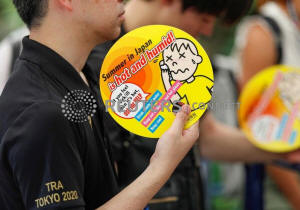Organizers test heat
countermeasures in sweltering Tokyo
 Send a link to a friend
Send a link to a friend
 [July 25, 2019]
By Jack Tarrant and Yoko Kono [July 25, 2019]
By Jack Tarrant and Yoko Kono
TOKYO (Reuters) - With temperatures
rising to 35 degrees Celsius and humidity of 75% on Thursday, Tokyo
2020 organizers had the perfect weather to try out their heat
countermeasures and preparedness for next year's Olympics at the
beach volleyball test event.
Although it has been less hot this year, a record heatwave in July,
2018, killed over a dozen people in Tokyo with monthly average
temperatures transcending 30 degrees for the first time in 20 years.
Tokyo 2020 organizers will employ wet bulb globe temperature (WBGT)
measuring devices at all venues as a step in their readiness for
high temperatures.
The WBGT device factors in temperature, humidity, wind speed and
solar radiation, producing a rating based on the variables and the
Tokyo Metropolitan Government (TMG) advise citizens against
exercising when the WBGT rating is over 31.

On Thursday, however, the WBGT rating at the beach volleyball venue
in central Tokyo was as high as 31.7 but organizers said it did not
mean that an Olympics event would be canceled should this happen
during the Games.
The WBGT reading will be one of many factors to be considered, in
consultation with the sport's federation, while judging the safety
of an event going ahead, the organizers said.
"It all depends on a situation, but for the spectators, we will
prepare cooling facilities and goods for them," said Ken
Wakabayashi, an environment official at TMG.
"At the same time, we would like to encourage them to get
information on heat countermeasure and enjoy the event."
[to top of second column] |

Visitors use paper fans featuring attention-seeking messages on heat
during a proving test of heat countermeasures for the Tokyo 2020
Olympic and Paralympic Games at the venue of FIVB Beach Volleyball
World Tour, also acting as a test event for the games, in Tokyo,
Japan July 25, 2019. REUTERS/Issei Kato

Among other countermeasures tested were water vapor sprays for
supporters arriving at the venue, shaded or air-conditioned rest
areas within the venue, and the distribution of water and ice packs
to athletes and fans.
With two people this week needing medical treatment at the beach
volleyball, including a person who suffered a heatstroke, organizers
also wanted to test their readiness for people falling ill during
the Games.
The TMG said their first aid response worked well.
"As far as our First Aid Station is concerned, I think we managed to
make a correct judgment and provide an appropriate treatment," said
Tomoko Suemura, who works within TMG's Games preparation department.
"We feel it is necessary to discuss how to deal with various medical
cases in coming months."
(Reporting by Jack Tarrant; editing by Sudipto Ganguly)
[© 2019 Thomson Reuters. All rights
reserved.] Copyright 2019 Reuters. All rights reserved. This material may not be published,
broadcast, rewritten or redistributed.
Thompson Reuters is solely responsible for this content.
 |